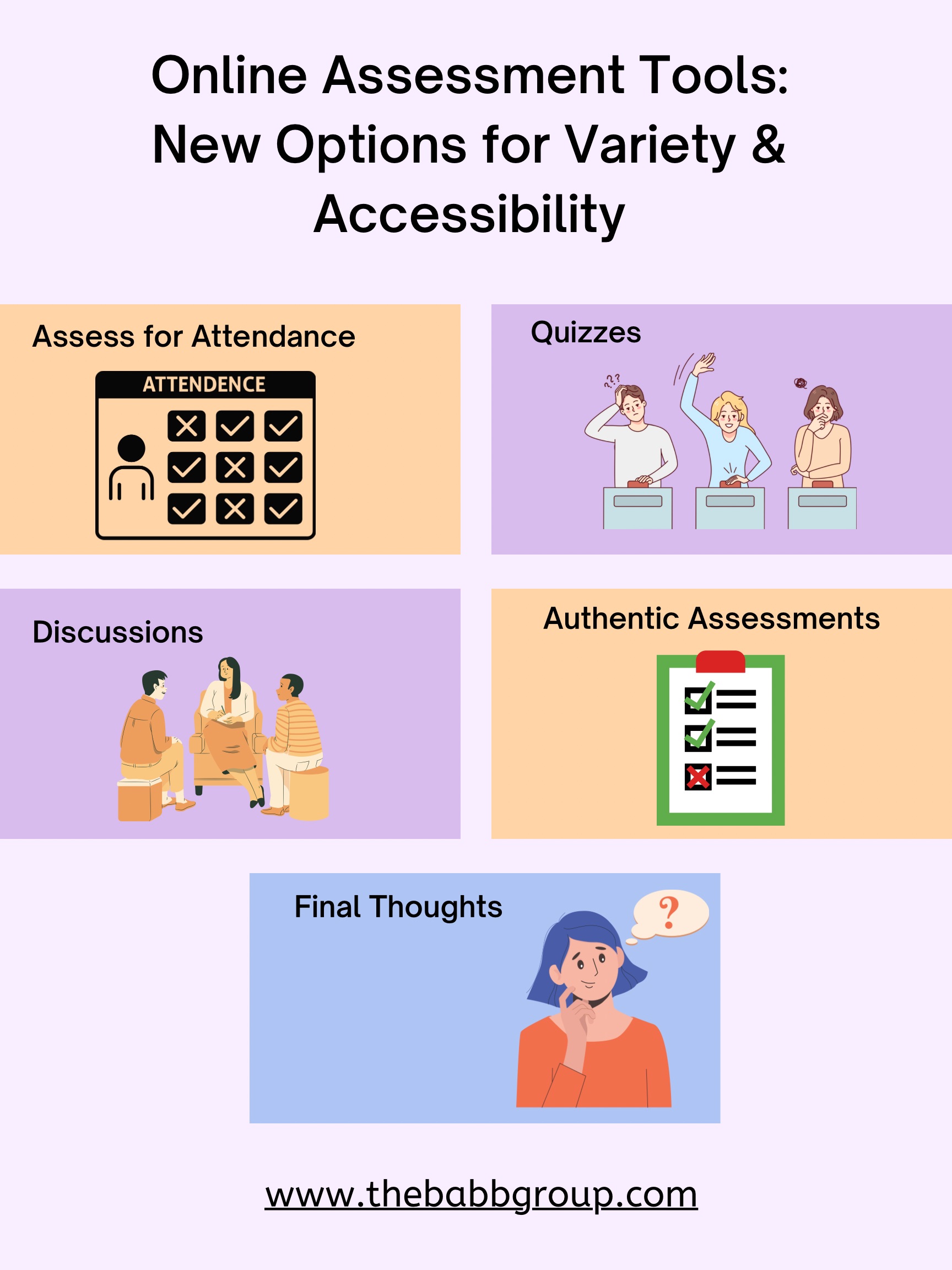Variety is the spice of life. The same is true of assessments. Institutions have different policies about the purpose, types, and number of assessments required for credit courses. In some online classrooms, participation in multiple discussions, quizzes, and written assignments are required each week. In other online courses, instructors use fewer milestones over the term.
Here’s how you can use each type of assessment to develop various tools to help students succeed.
Assess for Attendance
Many schools use low-stakes quizzes to ensure students review the syllabus. Low-point value quizzes are also used to measure weekly attendance. If students take the quiz, they get credit for attendance which can impact financial aid, even if they skip higher-stakes assignments.
Participation in a discussion board can also demonstrate attendance.
Quizzes
Quiz functions in learning management systems are often created with accessibility features. Quizzes are low-risk opportunities that can serve several purposes in an online classroom. As pre-tests, they point out knowledge gaps and point students where to focus their learning.
In online higher ed, pre-tests can stimulate interest, keep students focused on their participation and readings, and demonstrate understanding.
Think about the last human resources-type knowledge check you had to complete for a topic such as phishing scams, cybersecurity, or Title IX. Sometimes knowing that a test of your new knowledge is coming at the end forces you to pay more attention. The same can be true in online college classrooms where students can practice and reinforce concepts. Immediate feedback ensures students can improve and apply their learning to higher-stakes assignments.
Discussions
Discussion boards are familiar to most instructors and students, even if they are only used for introductions to the instructor and other students. For many, the discussion board is an area to create online communities.
Many instructors are using the discussion board as a tool for peer review. Students share their authentic assessments with peers for feedback.
To create a more accessible discussion board, be mindful of requiring video responses. Videos may impact students with visible disabilities who do not want to disclose them to their peers and instructor. Allow students to respond using different media, including videos, slides, infographics, multimedia, and written posts.
Authentic Assessments
Authentic assessments generally demonstrate skills relevant to practical, real-world tasks. According to Grant Wiggins (1998), author of Understanding by Design, authentic assessments are realistic, tied to real-world applications, are simulations to tasks used by practitioners in the field, and have more than one correct answer.
Examples include portfolio projects, creating infographics, creating multimedia, creating products, group projects, peer reviews, creating assessments for peers, and creating case studies.
Final Thoughts
According to the National Center on Educational Outcomes, in the past, some students only had accessibility through accommodations. It used to be that the only assessment options were a midterm, final, or paper, and students would need to request extra time, a proctor, the use of graph paper, a reader, and other types of accommodations to complete the assessment. Now, we can provide a variety of accessible assessments throughout a course that provides each student with opportunities to succeed.
Source: Wiggins, Grant. (1998). Ensuring authentic performance. Chapter 2 in Educative Assessment: Designing Assessments to Inform and Improve Student Performance. San Francisco: Jossey-Bass, pp. 21 – 42.
Angela Britcher
Latest posts by Angela Britcher (see all)
- Enhancing First-Year Experiences in Higher Education - August 1, 2024
- Enhancing Education with Virtual Reality: A Hands-On Approach - June 27, 2024
- Higher Education Trends: Insights from Our COO, Sheila Fry - June 13, 2024
